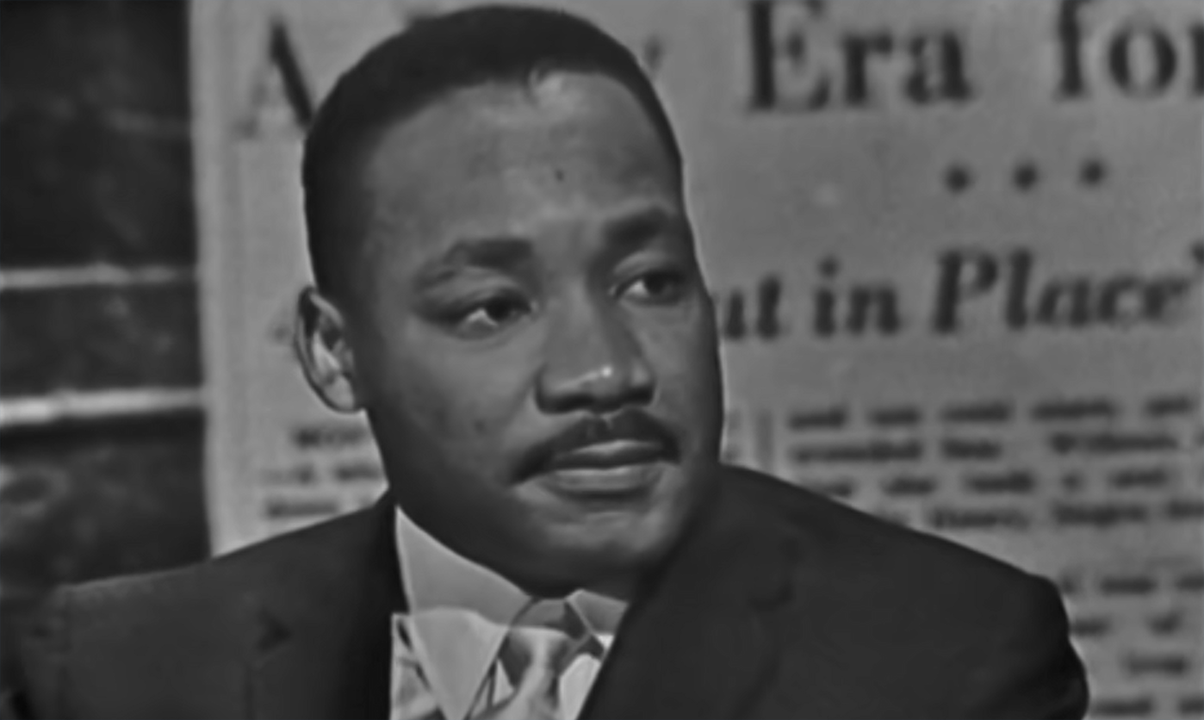In 1959, Martin Luther King, Jr. sat down with panelists on a CBC program to discussion racial segregation in America and how Dr. King believed integration could be achieved in the future.
TRANSCRIPT
Interviewer: If you were in charge of rectifying this situation what decisions would you make how can we best rectify the for the whole problem of segregation?
MLK: Well, I think it will tell many forces working together. There isn’t one answer. One hand, or one force that will solve the problem. It means that the federal government will have to do a great deal and taking a positive, forthright stand. The moderates of the white South will have to become more courageous and positive on there stand, and liberals all over the country. And I think the church religious organizations have a great deal to do in this period of transition. And the attitude of the Negro himself he must be firm. He must work continuously for first-class citizenship but certainly he must not do second-class methods to gained it. I think the methods of are important and thinking in terms of the end.
Interviewer: What do you mean by second-class methods?
MLK: Well, I would think of violence as a second class method. I would think of hatred as a second class method it seems to me that it is possible to move on toward the goal of justice with wise restraint and calm reasonableness not compromising principles and never capitulated to the whims and caprices of the guardians of the deadening status quo. But at the same time maintaining a positive attitude of good work.
Interviewer: Dr. King, how long do you think it will be before the Negro in the southern states attains racial equality, social equality?
MLK: Well, I would have to make a distinction here between desegregation and integration. Now on the question of desegregation, I think within 10 or 15 years we will achieve desegregation. We will break down the legal barriers in almost all areas except in the most remote situations. Now when we think in terms of integration, which is genuine intergroup into personal living, that will take longer. I think however before the turn of the century we will greatly to an integrated society.
Interviewer: Do you believe doctor Dr. King that racial and religious prejudice, generally speaking, feeds on ignorance?
MLK: Well, I think so.
Interviewer: Dr. King, you mentioned the church’s role in this some of the churches in the south are still segregated, aren’t they?
MLK: Oh yes. By and large the churches in the south.
Interviewer: How can they preach the Christian religion and segregate people? This must seem ironic to you as the minister yourself.
MLK: Yes it is but this is a perennial problem. This whole problem with the gap between our profession and our practice.
Interviewer: Billy Graham changed his mind on this thing, didn’t he?
MLK: Yes, he has taken in recent years a very active, I mean or a strong stand against segregation. that was a time but he even preached before segregated audiences but now he refuses to preach to any audience that is segregated, which I think is a marvelous step.
Interviewer: Am I right in suspecting there’s a large body of the white South who do not raise their voice but who have more liberal views than we get in Canada from the newspaper reports?
MLK: Oh yes, I think you’re quite right. I’m convinced that there are many more moderates and people of goodwill in the white South and we’re able to see on the surface, but they are afraid to speak out today fear of social political and economic reprisals.
Interviewer: Dr. King, you recently visited India and had talks with Mr. Nehru and tonight you tell us it’s useful and desirable that there should be no violence in your cause. Did you get these ideas from Mahatma Gandhi?
MLK: Yes, I would say from Mahatma Gandhi and Jesus. My whole Christian background had a great deal to do with my coming to this conclusion that love and non-violence should be the regulating ideals and any struggle for human dignity and along with this I read Mahatma Gandhi and my student days and got a great deal from him.

Blog dedicated to news and viewpoints from Black journalists who support, and inform, communities of color.
Original content, and curated articles, are posted and updated daily.
